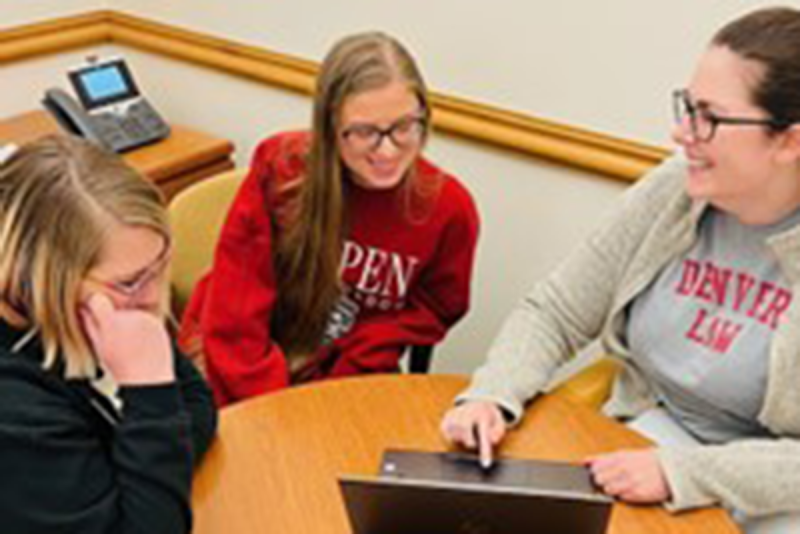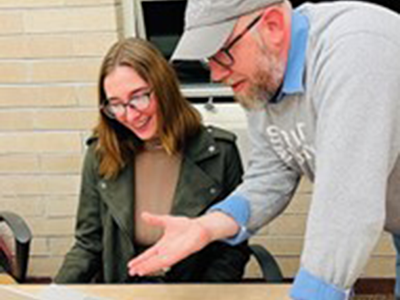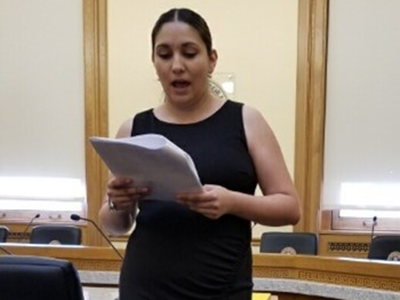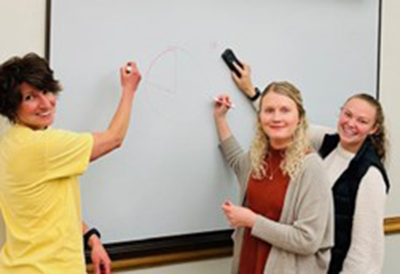The First Year of the Advancing Social Change Clinic

ASCC students Kesslee Stewart, Amanda Pinkham, and Kit Longnecker work on a project for a clinic partner.
Now closing out its second semester, the Advancing Social Change Clinic (ASCC) is the newest clinic in the Sturm College of Law’s Student Law Office. The ASCC is the only clinic at Denver Law which is specifically structured for the law school’s well-established Professional Part-time JD Program.
Under the supervision of Associate Professor Lindsey Webb, ASCC students work in support of local and national organizations and coalitions who are seeking to advance racial justice. Having taught clinical and other experiential courses in Denver Law’s full-time program for many years, Webb wished to create a similarly robust clinical course tailored specifically to the parameters of the part-time program. The ASCC seminar takes place on weekends when the part-time program classes meet, and all supervisions and partner work are structured around the schedules of the clinic students, most of whom work full-time in addition to attending law school.
Despite their busy schedules, ASCC students devote significant time to working on projects for the clinic’s community partners. In the first two semesters, student teams supported the work of the Colorado Youth Justice Collaborative, End Slavery Colorado, the Transformative Justice Project and the Social Movement Support Lab. In the clinic’s seminar, ASCC students are exposed to the philosophy of movement lawyering, including principles of organizing, strategic communications, and data analysis, as well as the ways in which social change is impacted by political and legislative efforts. These themes are reflected in the work for the clinic partners, which includes collecting and analyzing data; conducting legal and social science research; writing literature reviews, memos, and op-eds; drafting open records act requests; interviewing community members; assisting with social media campaigns; engaging in legislative analysis; and more.
In reflecting on their time in the clinic, ASCC students have noted the ways in which lawyers can use their skills to create social change both in and out of the courthouse, while also thinking carefully about the values that will shape their own legal careers. Students have positive feedback about the new clinic:
“During my time in the ASCC … I gained experience in policymaking and came to understand what makes—or breaks—legislative initiatives. I loved my time doing this work because it was done with a community and centered on the youth voices we advocated for. It also gave insight to legislative work and local politics that isn’t always understood by the public. Overall, I earned the power of storytelling, flexibility in strategic approach and how to preserve hope in times of doubt.” – Marisa Olivas, ASCC Spring 2023
“Being part of the ASCC allowed me to cultivate practical legal skills in a firm-setting— such as drafting legal documents, conducting legal research to advance the objectives of partner organizations and conducting investigative interviews—which is an opportunity often inaccessible to non-traditional students, such as myself. As a result of the ASCC, I am more invigorated and prepared to be an advocate and I feel a greater sense of inclusion in the Denver Law community.” – Monica Murguia, ASCC Spring 2023
“The thing that stands out to me about movement lawyering is that not every problem has a legal solution. We come to the work with our legal skill sets but the most important skill we bring is our listening and the most useful tool is our empathy. If we can’t listen to the community partners and meet them with empathy then we can’t build the trust with them that we need to do the work. I guess I’d say that you can’t be a movement lawyer without the legal education and skillset but they’re not the most important things a movement lawyer brings to their work.” – Charles Early, ASCC Spring 2023
"I will end my time in this clinic with a much more robust understanding of how to use my legal skills to advance social change in our community, and a reignited passion to pursue this work." –Chloe Henry, ASCC Fall 2023
“The ASCC has taught me that being a good lawyer is about more than just traditional lawyering skills, it is about slowing down and really listening to your clients. Working with my partner organization has shown me that even with all of the tools lawyers have, we cannot use them if we have not taken the time to understand our client’s needs.” – Jessica Grove, ASCC Fall 2023
“I have learned that good lawyering is grounded in decentering the lawyer, lots of listening, teamwork, and actively looking for effective ways to help the partner tell their story. Those are not often the features of lawyers on television, but they are the skills that can help create social change for real kids, families, and communities—and that is why I came to law school in the first place.” – Ariell Bachman, ASCC Fall 2023
“I never knew that I would be interested in legislation, but having the opportunity to work closely with Colorado’s youth to pass a bill brought me so much satisfaction and opened my eyes to a new area of the legal field. Incredibly thankful for the ASCC!” – Jennifer Lavoie, ASCC Spring 2023
“The ASCC clinic finally helped me to see myself in law in an authentic way, and it gave me hope that I could really use what I was learning to make an impact on issues that matter to me.” – Catherine Fink, ASCC Spring 2023
Looking back at the first year of this new clinic, Professor Webb is grateful for the hard work, good humor and dedication of the clinic’s students as well as the commitment and passion of the clinic’s community partners. She looks forward to future years of studying and teaching (and perhaps creating!) social change towards the goal of a more equitable world.





